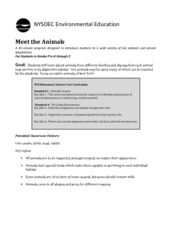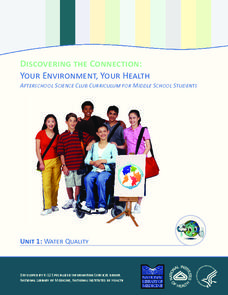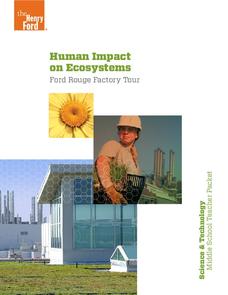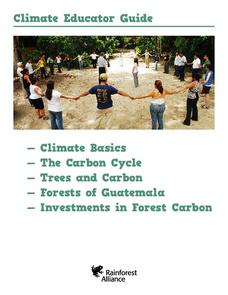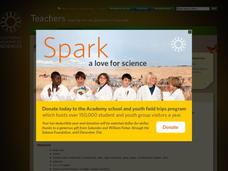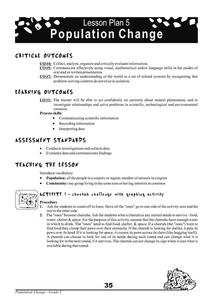Curated OER
Reading the River
In collaborative groups, young ecologists measure the temperature, pH, and dissolved oxygen for three different freshwater samples. They examine each sample with a microscope and record observations on the microorganisms in the pond...
Curated OER
Fossil Fuels: Facing the Issues
Students explore energy by researching fuel usage on Earth. In this fossil fuel lesson, students define fossil fuels, the energy created by burning them, and the impact on the environment when using them. Students conduct pollution...
Curated OER
Guess Who?
Getting ready for a lesson on animal adaptations can be a lot of fun. Kindergartners will go on an egg hunt. Once they have collected all the eggs, they will open them up to reveal an image of an animal. Each pupil will act out...
Curated OER
Workshop: Health Challenge
Students conduct Internet research in order to better understand the concepts of sustainable health design. In this design and architecture lesson plan, students gather data and creat a materials kit that responds to the challenges of...
Curated OER
Oil Well That Ends Well
Focusing on the effect of oil spills on the environment, learners conduct experiments to explore this issue. First, they create an ocean environment using materials provided. Then, they make a simulated crude oil substance from vegetable...
Curated OER
Vote on Disposal Options for Hazardous Household Products
In this health instructional activity, students realize that hazardous household products present special disposal challenges. Students view 11 images on an overhead projector and vote (thumbs up, thumbs down) on whether the disposal...
Curated OER
California Suit on Car Greenhouse Gases Dismissed
After reading an (attached) article about greenhouse gases, students reply to six questions about what they've learned. This activity would fit well into an environmental science class, a government class, or a current events class...
Curated OER
Meet the Animals
The class will examine a series of live or stuffed animals in order to learn how different animals survive in distinctive habitats. As they examine each animal, they will be asked a series of critical thinking questions geared at getting...
Teach Engineering
Introduction to Water Chemistry
What are the issues surrounding water quality? Viewers of this short presentation gain information about the importance of clean water, the lack of fresh water, water contamination, and ways that engineers treat water.
NASA
Hurricanes and Hot Towers with TRMM
Take cover because a wild presentation on hurricanes is about to make landfall in your classroom! An outstanding PowerPoint presentation is the centerpiece of this lesson. Not only does it provide information and photographs, but several...
National Library of Medicine
Your Environment, Your Health: Water Quality
How important is water quality where you live? The first module in a six-unit series includes four lessons on water quality. By applying the concept directly to the lives of pupils, they engage in meaningful learning. They read about...
National Library of Medicine
Your Environment, Your Health: Chemicals in Your Home
Many people know about chemical pollution, but are all chemicals bad? The third unit in a series of six addresses chemicals common in everyday life. Scholars learn about the chemicals found in their own homes, chemical safety, and...
Henry Ford Museum
Human Impact on Ecosystems
An environmenta science unit includes three lessons plus a cumulative project covering the ecosystem. Scholars follow the history of the Ford Rouge Factory from its construction on wetlands and how it destroyed the...
Rainforest Alliance
Climate Educator Guide
Climate change is a hot topic in the news. Class members examine carbon dioxide data to analyze trends of our atmospheric makeup over time. They also discuss climate and climate change, and determine how these changes are affecting life...
California Academy of Science
Greening Your Middle School
Middle schoolers redesign their school to make it more energy efficient, and create a model of their design. Learners get together in groups of 5, and they take on the task of making their school more energy efficient. To do this, they...
Captain Planet Foundation
Sorting Out Soils
Sift through soil and learn about why it's important for organic processes. After discussing what makes up soil, such as the living organisms and what types of soil have more nutrients, kids sample layers of mulch and deeper soil to...
Cheetah Outreach
Population Change
Your youngsters become cheetahs in search of food, water, shelter, and space in a fun physical game that does a fantastic job of representing fluctuating species population based on resources available over years.
Chicago Botanic Garden
Historical Climate Cycles
What better way to make predictions about future weather and climate patterns than with actual climate data from the past? Young climatologists analyze data from 400,000 to 10,000 years ago to determine if climate has changed over...
Environmental Protection Agency (EPA)
The Case of the Mysterious Renters
Upper-elementary kids examine the water usage in their own home, then use that data to solve a case in which a landlady is trying to determine how many people are living in an apartment being rented. Combine math, scientific method, and...
Roy Rosenzweig Center for History and New Media
Differences Among Colonial Regions
Classes look at and analyze primary source images to explore the differences between the colonial regions during the Revolutionary era. They break into groups to tackle each region and then present their findings to the class. A final...
Curated OER
Introduction to Macroinvertebrates
Third graders investigate the world of macroinvertebrates and identify the environmental stressors that threaten their existence. Outdoors, they role-play as stressors and invertebrates, with the intolerant species doing pushups, spins,...
Curated OER
Be the Kiwi: What is going on in New Zealand?
Young scholars study the three environmental issues facing New Zealand today. In this ecology lesson, students brainstorm some solutions to these environmental issues. They share what they have written in their journals.
Curated OER
Make a Statement!
Students discuss a class collection of bumper stickers dealing with an environmental issue. They discuss whether or not the bumper sticker have a positive effect or could change a person's viewpoiint.
Curated OER
Letters to Local and State Legislators
Pupils locate their local or state legislator's address. They write and send letters to their local and state legislators critiquing their voting record on environmental issues and sharing their own views on these issues.







